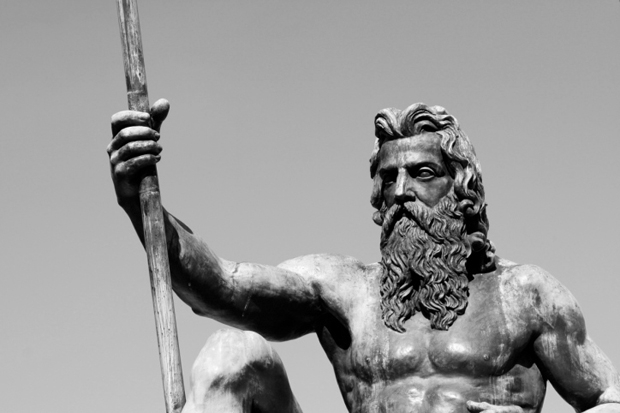Writing to a god seems a presumptuous thing. Who are we, feeble mortal creatures whose lives pass in the blink of an eye, to address the great immortal deities?
The Dutch writer Cees Nooteboom, now entering his ninth decade and never knowingly lacking in chutzpah, is not one to be deterred by such considerations.
Nooteboom is an immensely civilised and civilising writer, rich in curiosity and armed with a dazzling literary style. Those who already know his writing will not be surprised to discover that on the page, if not in the briny, he is more than a match for the trident-bearing earth-shaker, god of the sea.
Notionally written every autumn to request the god’s permission to return to his home in Minorca the following year, this collection of 23 letters, superbly translated by Laura Watkinson, takes the reader on an engrossing journey across continents, through museums, galleries and airports, in bars and gardens, on beaches and park benches.
The shifting locations, which reflect the magpie interests of Nooteboom the nomad, are stages for playful musings, elegant reflections on space and time and memory, jaunty conversations and restless inquisitions about the human condition. Pondering an elusive encounter in 1829 between Alexander Pushkin and a Kalmyk peasant girl, he asks the unanswerable. ‘Why is there no material aspect to thoughts, so that they still exist somewhere?’ Literary and artistic references abound (there are shades of Patrick Leigh Fermor, who crops up in the notes section writing about the Greek poet Cavafy). We have Kafka, Dante, Ovid, Homer, Hesiod, Rubens, Cézanne, Goya, Leonardo da Vinci, Chateaubriand, Proust…
One of the most arresting images, dredged from the depths of an inventive imagination, is that of a sea-bound Poseidon seeing the shadow of Jason’s Argo, the first ship ever to take to the oceans. As a BBC reporter would doubtless ask these days, how did he feel about it? And what did he make of the strange sight of the soles of Jesus’s feet during the fabled walking-on-water moment? Alas, this is by definition a one-way conversation, so we can never know. There is sport to be had, though, in seeing Nooteboom confronting Poseidon and his fellow gods over their lives of wanton revenge, adultery, lust, betrayal, rape and patricide. Whatever were they thinking?
Scattered among the letters to Poseidon are postcards and snapshots that range with wit and whimsy across all terrains. One of Nooteboom’s enviable hallmarks is his ability to make the ordinary sing. Watching birds feed one day, he comes to realise that
what for me is a view, pasture, trees, distant mountains, is food for the great tit and the jay. Jay makes a meal for fox; great tit is a dish for owl and buzzard. Nature is edible. Dinner is served.
As it is again when a whale dies in another little portrait, sinking to the bottom of the ocean to become a century-long dinner party for 400 species.
In Seoul Nooteboom drops in on a surreal installation of click-clacking donkeys moving around a recreation of Avignon’s Palace of the Popes ‘I am never too concerned about what is said about a work of art and what its “intended meaning” might be’, he writes in the Notes, and the same could be said of these scattergun vignettes and aperçus. For this reviewer they are a curious collection of treasures from Poseidon’s kingdom, flotsam and jetsam wildly flung across the shore from a life on the move.
From time to time Nooteboom hones in on tragedy. There is the briefest sketch of the Space Shuttle Challenger disaster, watching an expanding cloud of ‘powdered flesh and metal’ that betokens the ‘infinite disintegration of bodies of men and women who once had names’. A photo of an unremarkable lorry becomes remarkable when he describes a grim murder mystery around it. He cites Augustine’s Confessions to remind us what Isis terrorists in Iraq and Syria understand only too well; that as a species we are drawn to the spectacle of violence.
On the beach at his home in Minorca he picks up a stone that is 350 million years old. It leads him to wonder about Poseidon’s unfathomable age, from a time long before humans arrived on the planet. ‘What was that like, being a god without people? Is there any point? Were you bored?’
There is little chance that anyone reading Nooteboom would ever be bored. This is a sparkling little book, filled with wonder.
Available from the Spectator Bookshop, £12.99 Tel: 08430 600033. Justin Marozzi’s latest book is Baghdad: City of Peace, City of Blood.






Comments